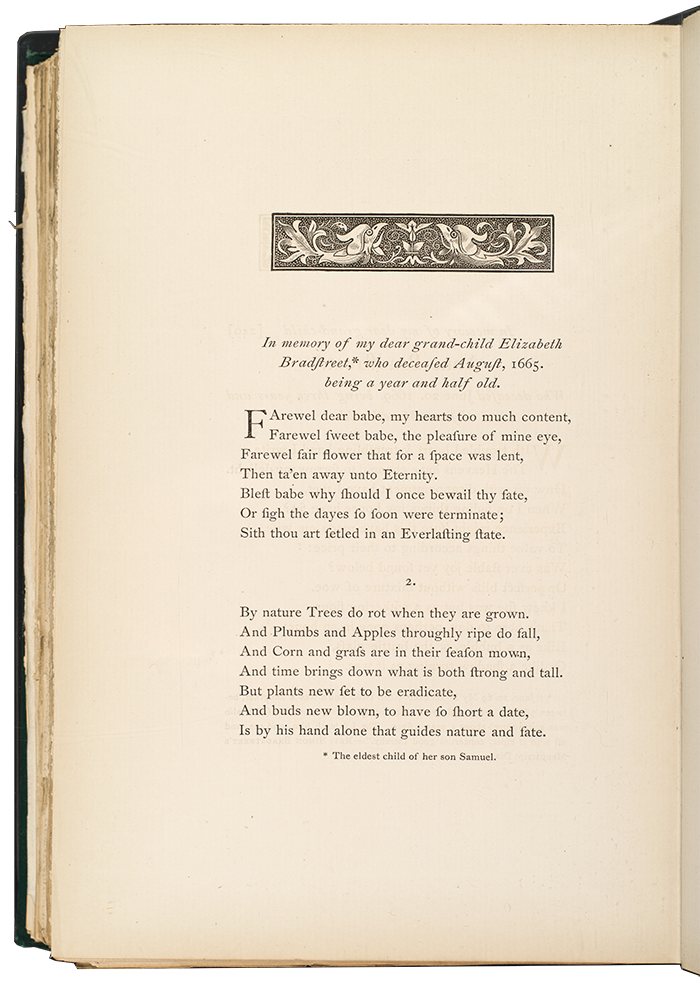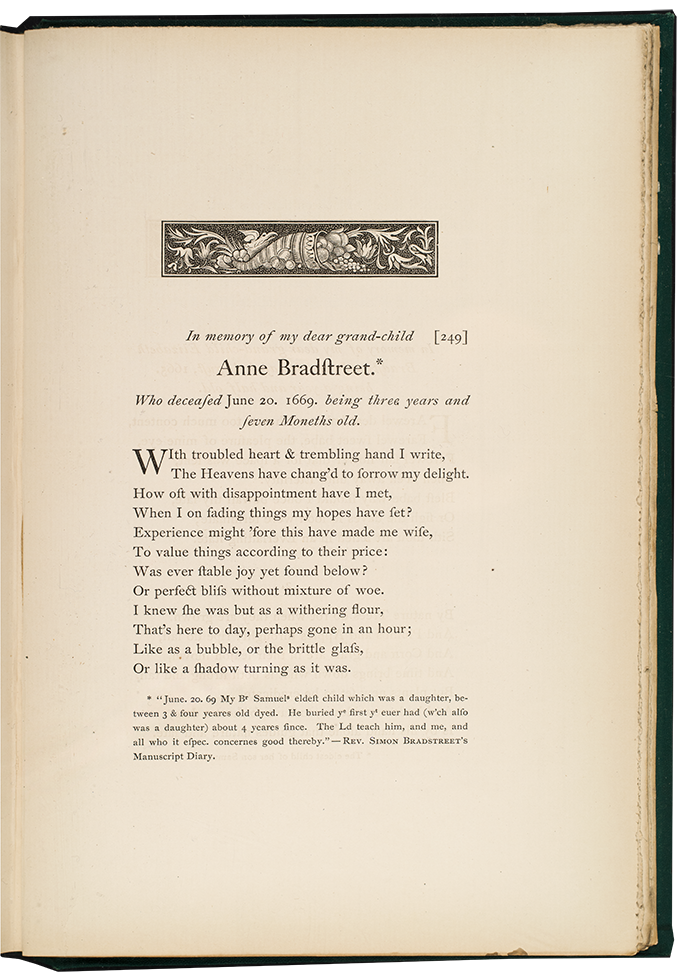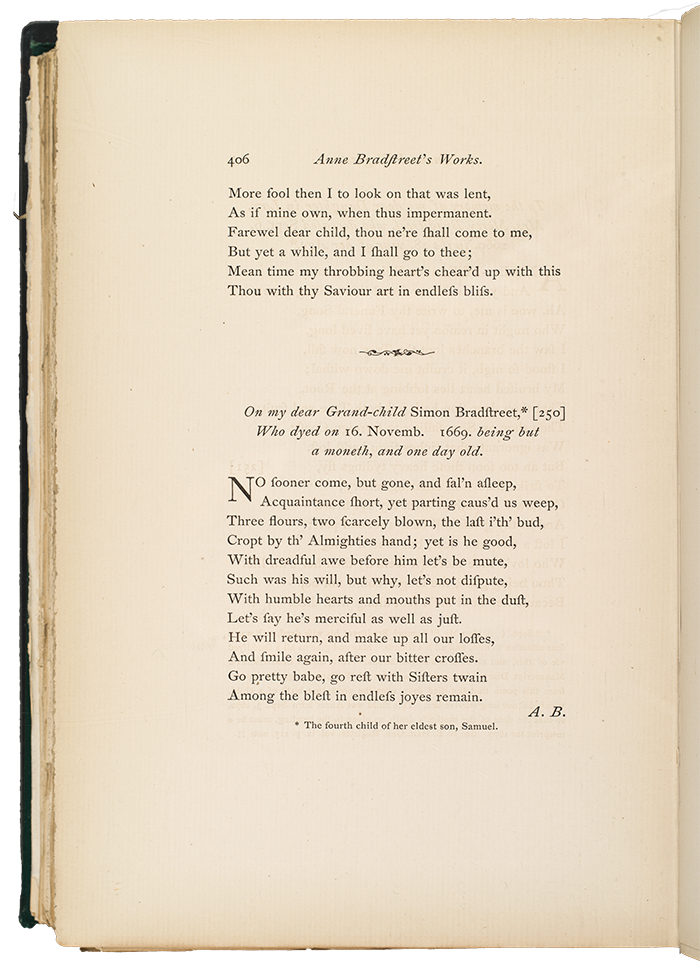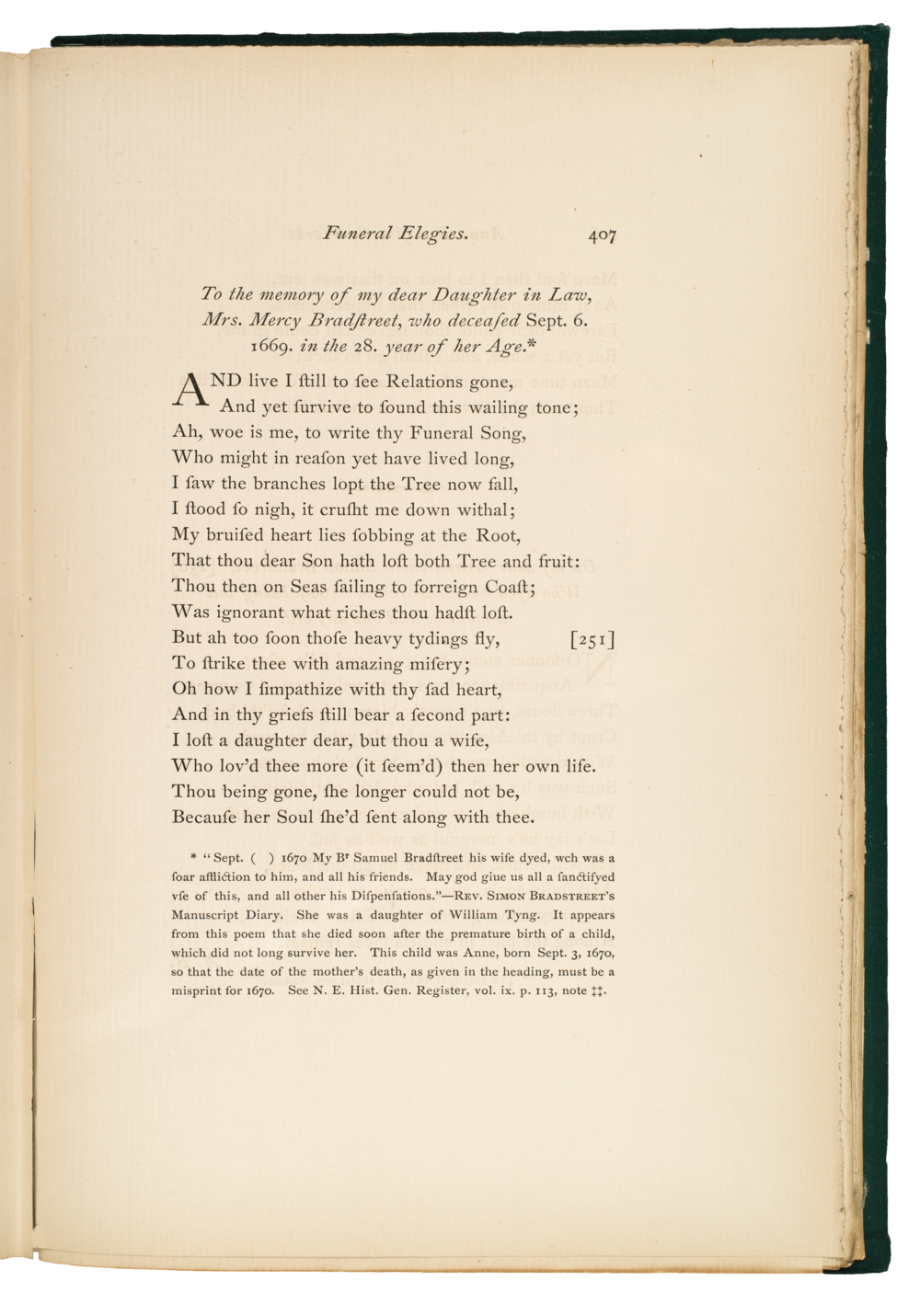Document Text
Farewel dear babe, my hearts too much content,
Farewel sweet babe, the pleasure of mine eye,
Farewel fair flower that for a space was lent,
Then ta’en away unto Eternity.
Blest babe, why should I once bewail thy fate,
Or sigh the dayes so soon were terminate;
Since thou art settled in an Everlasting state.
By nature Trees do rot when they are grown,
And Plumbs and Apples thoroughly ripe do fall,
And Corn and grass are in their season mown,
And time brings down what is both strong and tall.
But plants new set to be eradicate.
And buds new blown, to have so short a date,
Is by his hand alone that guides nature and fate.
Anne Bradstreet, “In memory of my dear grand-child Elizabeth Bradstreet, who deceased August, 1665. Being a year and half old,” in The Works of Anne Bradstreet in Prose and Verse. (Charlestown: A. E. Cutter, 1867). New-York Historical Society Library.
*The eldest child of her son Samuel.
In memory of my dear grandchild Anne Bradstreet. Who deceased June 20, 1669. Being three years and seven Months old
Anne Bradstreet, “In memory of my dear grandchild Anne Bradstreet. Who deceased June 20, 1669. Being three years and seven Months old,” in The Works of Anne Bradstreet in Prose and Verse. (Charlestown: A. E. Cutter, 1867). New-York Historical Society Library.
Document Text
With troubled heart & trembling hand I write,
The Heavens have chang’d to sorrow my delight.
How oft with disappointment have I met,
When I on fading things my hopes have set?
Experience might ‘fore this have made me wise,
To value things according to their price.
Was ever stable joy yet found below?
Or perfect bliss without mixture of woe?
I knew she was but as a withering flower,
That’s here to day, perhaps gone in an hour;
Like as a bubble, or the brittle glass,
Or like a shadow turning as it was.
More fool then I to look on that was lent,
As if mine own, when thus impermanent.
Farewell dear child, thou ne’re shall come to me,
But yet a while, and I shall go to thee;
Mean time my throbbing heart’s chear’d up with this
Thou with thy Saviour art in endless bliss.
Anne Bradstreet, “In memory of my dear grandchild Anne Bradstreet.* Who deceased June 20, 1669. Being three years and seven Months old,” in The Works of Anne Bradstreet in Prose and Verse. (Charlestown: A. E. Cutter, 1867). New-York Historical Society Library.
*”June. 20. 69 My Br Samuels eldest child which was a daughter, between 3 & four yeares old dyed. He buried ye first yt ever had (w’ch also was a daughter) about 4 yeares since. The Ld teach him, and me, and all who it espec. concernes good thereby.”—Rev. Simon Bradstreet’s Manuscript Diary
On my dear Grand-child Simon Bradstreet, Who died on 16 November 1669. Being but a month, and one day old
Anne Bradstreet, “On my dear Grand-child Simon Bradstreet, Who died on 16 November 1669. Being but a month, and one day old,” in The Works of Anne Bradstreet in Prose and Verse. (Charlestown: A. E. Cutter, 1867). New-York Historical Society Library.
Document Text
No sooner come, but gone, and fal’n asleep,
Acquaintance short, yet parting caus’d us weep,
Three flours, two scarcely blown, the last i’th’ bud,
Cropped by th’ Almighties hand; yet is he good,
With dreadful awe before him let’s be mute,
Such was his will, but why, let’s not dispute,
With humble hearts and mouths put in the dust,
Let’s say he’s merciful as well as just.
He will return, and make up all our losses,
And smile again, after our bitter crosses.
Go pretty babe, go rest with Sisters twain
Among the blest in endless joys remain.
Anne Bradstreet, “On my dear Grand-child Simon Bradstreet,* Who died on 16 November 1669. Being but a month, and one day old,” in The Works of Anne Bradstreet in Prose and Verse. (Charlestown: A. E. Cutter, 1867). New-York Historical Society Library.
“*The fourth child of her eldest son, Samuel.”
To the memory of my dear Daughter in Law, Mrs. Mercy Bradstreet, who deceased September 6, 1669. In the 28 Year of her Age
Anne Bradstreet, “To the memory of my dear Daughter in Law, Mrs. Mercy Bradstreet, who deceased September 6, 1669. In the 28 Year of her Age,” in The Works of Anne Bradstreet in Prose and Verse. (Charlestown: A. E. Cutter, 1867). New-York Historical Society Library. 1/2
Document Text
And live I still to see Relations gone,
And yet survive to sound this wailing tone;
Ah, woe is me, to write thy Funeral Song,
Who might in reason yet have lived long,
I saw the branches lopt the Tree now fall,
I stood so nigh, it crusht me down withal;
My bruised heart lies sobbing at the Root,
That thou dear Son hath lost both Tree and fruit:
Thou then on Seas failing to forreign Coast;
Was ignorant what riches thou hadst lost.
But ah too soon those heavy tydings fly,
To strike thee with amazing misery;
Oh how I sympathize with thy sad heart,
And in thy griefs still bear a second part:
I lost a daughter dear, but thou a wife,
Who lov’d thee more (it seem’d) then her own life.
Thou being gone, she longer could not be,
Because her Soul she’d sent along with thee.
One week she only past in pain and woe,
And then her sorrows all at once did go;
A Babe she left before, she soar’d above,
The fifth and last pledg of her dying love,
E’re nature would, it hither did arrive,
No wonder it no longer did survive.
So with her Children four, she’s now a rest,
All freed from grief (I trust) among the blest;
She one hath left, a joy to thee and me,
The Heavens vouchsafe she may so ever be.
Chear up, (dear Son) thy fainting bleeding heart,
In him alone, that caused all this smart;
What though thy strokes full fad & grievous be,
He knows it is the best for thee and me.
Anne Bradstreet, “To the memory of my dear Daughter in Law, Mrs. Mercy Bradstreet, who deceased Sept. 6. 1669. In the 28 Year of her Age,*” in The Works of Anne Bradstreet in Prose and Verse. (Charlestown: A. E. Cutter, 1867). New-York Historical Society Library. 1/2
“*’Sept. ( ) 1670 My Br Samuel Bradstreet his wife dyed, wch was a soar affliction to him, and all his friends. May god give us all a sanctifyed use of this, and all other his Dispensations.’—Rev. Simon Bradstreet’s Manuscript Diary. She was a daughter of William Tyng. It appears from this poem that she died soon after the premature birth of a child, which did not long survive her. This child was Anne, born Sept. 3, 1670, so that the date of the mother’s death, as given in the heading, must be a misprint for 1670. See N. E. Hist. Gen. Register, vol. ix. p. 113, note.”
Background
Anne Dudley Bradstreet was born in England in 1612, the daughter of the steward of the Earl of Lincoln. Her father’s position meant she had better access to books and education than most other women of her time. By the time she reached adulthood, Anne had developed a passion for writing poetry. In 1628 Anne married her father’s apprentice, Simon Bradstreet. Anne and her family were Puritans, a group of Christians who rejected the teachings of the Church of England. In 1630 she moved with her husband and father to the Massachusetts Colony to flee persecution in England.
Anne’s father and husband were both named assistant governors of the new colony, which meant that Anne and her family were part of the colony’s elite. Anne gave birth to eight children. Her privileged position meant she could afford to have servants to help her care for her household, which gave her time to write.
In 1650 Anne’s brother-in-law brought a collection of her poems to London and found a publisher. The book, called The Tenth Muse, lately Sprung Up in America, made Anne the first published female poet of the English colonies.
About the Document
Life expectancy in the early colonies was short, and the death of a loved one was a common occurrence. War, disease, accidents, lack of medical care, and malnutrition were all common causes of death for colonists. Infant mortality rates were especially high because of these challenging conditions. For mothers in the colonial period, it was not uncommon to lose several children in infancy. These losses were often emotionally devastating.
Collected here are four poems Anne wrote in 1665 and 1669. The poems mourn the death of four of her grandchildren and her daughter-in-law Mercy. Through these poems the reader feels the heartbreak Anne experienced after each loss as well as her struggle to reconcile her religious faith with the harsh reality of life in the colonies.
Vocabulary
- apprentice: A person who learns a trade from a more skilled employer.
- Christian: A person who believes in and follows the teachings of Jesus Christ.
- Church of England: Also called the Anglican Church. A Protestant Christian church that is led by the king or queen of England.
- malnutrition: Sickness from lack of proper food.
- Puritans: A group of English Protestants who left England for the New World to start their own settlements where religion would govern daily life.
- steward: A person who looks after another person’s property.
Vocabulary
- below: On earth.
- bewail: Mourn.
- blown: Blossomed.
- content: Joy.
- deceased: Died.
- eradicate: Destroyed.
- e’re: Before.
- ‘fore: Before.
- ne’re: Never.
- nigh: Close.
- terminate: Ended.
- tydings: News.
- twain: Two.
- woe: Sadness.
- withal: Also.
- withering: Dying.
Discussion Questions
- What do Anne Bradstreet’s poems reveal about the challenges women faced in the Massachusetts Colony?
- How does Anne Bradstreet balance her anger and grief with her religious faith?
- Why do you think a publisher was interested in printing these poems in England?
Suggested Activities
- APUSH Connections:
- 2.2 European Colonization
- 2.7 Colonial Society and Culture
- Use these poems when discussing life in the early colonies to demonstrate how even the most elite families were affected by high mortality rates.
- Invite students to analyze more of the poetry of Anne Bradstreet to learn more about the life and thoughts of a Puritan woman in Massachusetts in the 1600s.
- Compare Anne Bradstreet’s poetry with the poetry of Sor Juana Inés de la Cruz in A Nun Challenges the Patriarchy. What similarities do they share? What differences? What accounts for the differences between the works? How do these two religious women reconcile their faith with their circumstances?
- Pair this life story with Life Story: Mary Dyer to consider the impacts of high infant mortality rates on women in the English colonies.
- For a larger lesson on the experiences of women in the Puritan English colonies, combine this resource with any of the following:
- Religion was a powerful force in the daily lives of women in the European colonies of the Americas. Combine this life story with any of the following resources for a lesson on colonial women and religious life:
- Anne Bradstreet was one of many women who made important contributions to the Enlightenment. Combine her story with the resources below for a lesson about women and the Enlightenment in the colonies:
Themes
DOMESTICITY AND FAMILY










